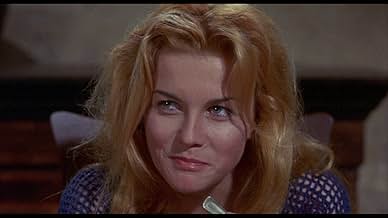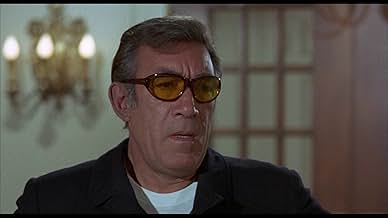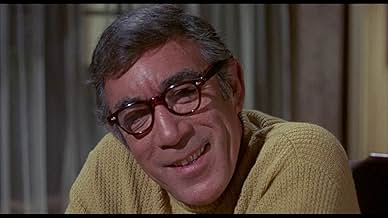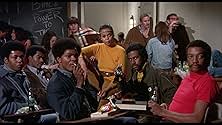Agrega una trama en tu idiomaR.P.M. stands for (political) revolutions per minute. Anthony Quinn plays a liberal college professor at a west coast college during the heady days of campus activism in the late 1960's. Rad... Leer todoR.P.M. stands for (political) revolutions per minute. Anthony Quinn plays a liberal college professor at a west coast college during the heady days of campus activism in the late 1960's. Radical students take over the college, the president resigns, and Quinn's character, who has... Leer todoR.P.M. stands for (political) revolutions per minute. Anthony Quinn plays a liberal college professor at a west coast college during the heady days of campus activism in the late 1960's. Radical students take over the college, the president resigns, and Quinn's character, who has always been a champion of student activism, is appointed president.
- Dirección
- Guionista
- Elenco
- Estella
- (as Ines Pedroza)
- Dirección
- Guionista
- Todo el elenco y el equipo
- Producción, taquilla y más en IMDbPro
Opiniones destacadas
But here's the insulting part of the film, why dear vibrant, sexy Tony should never have taken the part: he's shown as over-the-hill and unable to relate to the wild generation. He wears reading glasses, he takes terrible insults from the students, and his girlfriend tells him "Pull in your gut" when he walks around naked. (Sorry ladies, he's given a flesh-colored thong to protect his modesty.) One could argue that he's still young and hip enough to go to bed with Ann-Margret, but as the movie progresses, the students are so disrespectful, they show the real generation gap: manners and decency. Even though Tony doesn't agree with the kids, he still tries to treat them with respect, but the angry, protesting teenagers don't give him the same courtesy.
There will be a large chunk of audience members who side with the teenagers, and that makes me both sad and disgusted. Manners never go out of style, and using them doesn't show weakness or inflexibility. It shows class, the ability to see the bigger picture, and maturity. Tony may belong to the older generation with graying hair and a growing tummy, but I'll happily join him any day of the week.
Erich Segal's script is trite and hardly rises above comic-book level. Concerning the film's direction, where is the genuine emotion and character development? Anthony Quinn is always good, but in this movie he is miscast. Worse, 30 year-old Ann-Margret's performance as a collegian is ludicrous; she is way too old to be a typical grad student. As she does not exactly radiate intelligentsia, one wonders how she ever became an undergraduate. The impression does arise that she may have earned her bachelor's degree by lying on her back. Chemistry is lacking between her and lover Quinn, whom she even calls a hypocrite. Both Lockwood and Winfield are also too old for their respective characters.
The late 1960s and early 1970s was a time of college campus radicalization, although the students on the far left comprised only a small percentage of the school population. But they were both vocal and active. They were quite volatile, hence R.P.M. = Revolutions per Minute. All in all, this pointless movie certainly shows its age.
The campus radicals, led by 33-year-old long-haired undergraduate Gary Lockwood, have occupied one of the buildings on campus, and have a list of demands. One of them is that the students should hire the faculty. (After being in academia for 40 years, I will admit they may be on to something.) Token black radical Paul Winfield also wants a black man on the Board of Trustees. When Quinn suggests a candidate, Winfield wants to know how black he is. Quinn asks if he wants a skin sample. One of the trustees points out that there are no engineering students taking part in the rebellion; just English and psychology majors. That's the extent of the hilarity in this film.
Now settle in for lots of blather and inaction, as the students accuse Quinn of being part of the "establishment." There are a couple of "right-ons" and other dialogue I could not understand. Lockwood et al finally threaten to destroy the campus computer (Lockwood is apparently still ticked off at HAL). Enter the club-wielding campus police, who, oddly, are not referred to as the "fuzz" or even "pigs." What kind of campus is this? A few skulls get cracked, butts get kicked, all this while director Stanley Kramer shoots the scenes through a blurred lens. Great. The one time we finally get some action, and we might as well be underwater. There was probably more violence taking place in theaters, as audiences rushed to the exits.
In the final scene, Quinn tells Lockwood to "stay loose, man." Then Melanie sings a song.
Woodstock was in August of 1969. Altamont was in December of 1969. This means that the Woodstock Nation lasted barely four months. Elizabeth Taylor has kept husbands longer than that.
What the major studios did was get mainstream directors and told them make movies about youth in revolt. The result was movies like this which were very expensive imitations of movies that American-International had made in the sixties on nonexistent budgets.
RPM is watchable for a fine performance by Anthony Quinn. Lord, but he's a trooper. The script was obsolete before the ink dried on it. I'll be generous and say that Eric Segal's screenplay stinks. Of course, forty years later LOVE STORY doesn't get all that much love anyway.
The story centers on a Sociology professor who is picked to be president of a fictional college after protesting students occupy the administration building. The board has a late night meeting and decides to appoint Quinn president based primarily on the fact that he's sleeping with a graduate student in his department who is young enough to be his daughter.
Imagine trying to sell that to a major studio in today's Politically Correct world. Ann-Margret plays the graduate student and recognizes the script to be crap, so she has fun playing this airhead and wears ridiculous costumes and, in one scene, talks with while chewing food so that audiences won't have to understand the words she's saying.
Incredibly, this is directed by Stanley Kramer. Kramer had become a legend directing films like THE DEFIANT ONES, INHERIT THE WIND, SHIP OF FOOLS, JUDGMENT AT NUREMBERG, and GUESS WHO'S COMING TO DINNER, all of which dealt with Big Ideas from a socially progressive point of view. More importantly, they were full of characters that audiences could identify with and were fully realized human beings.
RPM is like a pageant put on by a community college Sociology department. Characters represent Sexual Freedom, Corporate Apathy, Prejudice, Sexual Liberation, Black Power, etc.
At its peak, the student revolution actually appealed to a very small per cent of students and had little support from the mainstream community. Worse yet, this film was released in the middle of Nixon's first term of office. Youthful idealism faded as more students pursued graduate studies in Business Administration.
Thanks to Turner Classic Movies for running this. I'd heard of it, but figured that Columbia Pictures had destroyed all the existing prints hoping nobody would remember it. Somehow TCM found a pristine print in excellent condition. It would have gotten just one out of ten, but I had to recognize Quinn's excellent work trying to make a dead horse run.
Anthony Quinn is a popular sociology professor of Hispanic heritage and has something of a following among the radical left on campus. When President John Zaremba just resigns in frustration because he can't deal with a bunch of students occupying the campus administration building. Quinn also has a student mistress in the person of Ann-Margret a rather open secret on campus.
The Board of Trustees decide on what they consider a master stroke, make the popular Quinn the new president because they think he can talk the radical talk and make them walk. It doesn't quite work out that way as Quinn all too well realizes that he's now part of the 'establishment'.
The students who are all too old to be playing campus radicals include spokesperson Gary Lockwood and black student leader Paul Winfield. Fine players but all showing their age. Ann-Margret is a graduate student, but even she looks a bit old to be college coed.
It ends in a scene that was all too familiar in the Sixties, police raiding the school and making arrests. At some point the students have to get back to the business of education.
Fascinating that the big threat they had was to destroy the giant computer that the college had if they didn't get their way. Now Bill Gates and the late Steve Jobs would have a fainting spell dare they suggest such a thing.
R.P.M. marked the beginning of when director Stanley Kramer started to lose his muse. It is truly truly dated.
¿Sabías que…?
- TriviaStanley Kramer always referred to this film in interviews as his least favorite and least successful of the films he has directed.
- Citas
Prof. F.W.J. 'Paco' Perez: "Lickety split"? Where do you get your vocabulary?
- Créditos curiososAs the opening credits roll, the screen flips like a coin-like wipe with the text appearing in the center of the "coin".
- ConexionesFeatured in Two Sides of the Coin: The Songs and Music of 'R.P.M.' (2019)
- Bandas sonorasStop! I Don't Wanna' Hear It Anymore
Written by Barry De Vorzon & Perry Botkin Jr.
Additional lyrics by Melanie
Performed by Melanie
Courtesy of Buddah Records
Selecciones populares
- How long is R.P.M.?Con tecnología de Alexa
Detalles
- Fecha de lanzamiento
- País de origen
- Idioma
- También se conoce como
- R.P.M. */* Revolutions per minute
- Locaciones de filmación
- Productora
- Ver más créditos de la compañía en IMDbPro
- Tiempo de ejecución1 hora 32 minutos
- Mezcla de sonido
- Relación de aspecto
- 1.85 : 1
Contribuir a esta página































